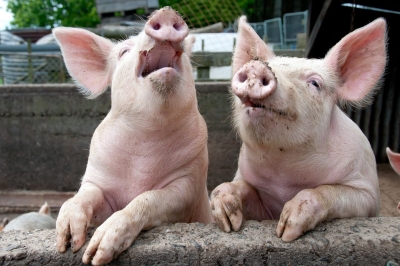
The grunts made by pigs vary depending on the pig’s personality and can convey important information about the welfare of this highly social species, new research has found.
Scientists specialising in animal behaviour and welfare devised an experiment to investigate the relationship between personality and the rate of grunting in pigs. They also examined the effect different quality living conditions had on these vocalisations.
Findings from the study, carried out by researchers from the University of Lincoln, UK, and Queens University Belfast, are published in the Royal Society journal Open Science.
The study involved 72 male and female juvenile pigs. Half were housed in spacious ‘enriched’ pens with straw bedding, while the other half were kept in more compact ‘barren’ pens with partially slatted concrete floors, which adhered to UK welfare requirements.
To get a measure of the pigs’ personalities, the researchers conducted two tests: a social isolation test and a novel object test. Each pig spent three minutes in social isolation, and five minutes in a pen with a large white bucket or an orange traffic cone they had not previously encountered. Their behaviour, including vocalisations, were observed. These tests were repeated two weeks later, allowing the researchers to determine if the pigs’ responses were repeatable — the defining characteristic of personality (also known as ‘coping style’ in animals).
They also recorded the frequency of grunts they made by counting the number of grunts produced per minute of the test, and investigated the effect different quality environments had on the sounds made.
The study indicated that pigs with more proactive personality types produced grunts at a higher rate than the more reactive animals. The study also found that male pigs (but not females) kept in the lower-quality conditions made fewer grunts compared with those housed in the enriched environment, suggesting greater susceptibility among male pigs to environmental factors.
The results add to evidence that acoustic signalling indicates personality in pigs. This may have had far reaching consequences in shaping the evolution of social behaviours, the researchers believe. The findings also suggest personality needs to be kept in mind when using vocalisation as a measure of the animals’ welfare status.
Credit : Science Daily
Picture Credit : Google




